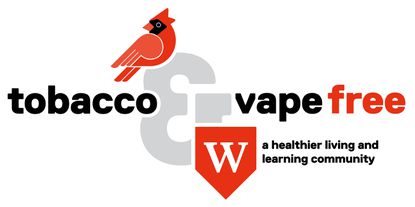
The University implemented a policy that prohibited smoking, vaping, and other smokeless tobacco products in all indoor and outdoor areas on the campus on Saturday, Jan. 1.
“This initiative applies to all students, faculty, staff, visitors, contractors, and other persons on campus, regardless of the purpose of their visit,” the WesWell policy FAQ reads. “All members of the Wesleyan community share the responsibility to respect this policy. The goal of this initiative is to be educational, supportive, and engaging to encourage individuals who use tobacco and vape products to quit. Through continued peer support and voluntary compliance, the goal remains to foster behavior and culture change over time.”
According to WesWell Alcohol and Other Drug Specialist September Johnson, the University’s new designation as tobacco and vape free is intended to emphasize the health benefits of quitting smoking. The University has been working on the policy for the past year, with Johnson emphasizing that the initiative was a collective effort by students and staff.
“Representatives from WesWell, Residential Life, Athletics, Human Resources, Facilities, Bon Appetit, CAPS [Counseling and Psychological Services], and more were on the committee that helped implement this policy,” Johnson wrote in an email to The Argus. “Throughout the development of this policy, student input and feedback, from athletes, student staff from Residential Life, [Wesleyan Student Assembly (WSA)], a student town hall, and more, was utilized to help shape the language of the policy, ideas for supportive resources, and how to make this policy as equitable as possible.”
According to Johnson, the University decided to label the new policy as “tobacco and vape free” instead of the more general “smoke free” to differentiate it from the University’s existing Drug and Alcohol policy, which prohibits students and employees from unlawfully possessing, using, or distributing illicit drugs—including alcohol—while on campus.
“The tobacco and vape free policy only applies to nicotine-based products,” Johnson wrote. “Other substances that could be smoked would fall under the [U]niversity’s alcohol and other drug policy. Smoke was not included in the tobacco and vape free policy to try to limit and minimize any confusion surrounding the two policies.”
Before this, the University’s generalized smoking policy allowed smoking on campus as long as individuals were 20 feet from building entrances. The new tobacco and vape free policy bans tobacco and vape products on campus entirely.
“The tobacco and vape free policy does not allow tobacco or nicotine-based vape products anywhere on Wesleyan property and applies to all students, faculty, staff, visitors, contractors, and other persons on campus, regardless of the purpose of their visit,” Johnson wrote.
This policy is intended to improve student access to resources for quitting, including free nicotine gum and patches on campus from WesWell. WSA Senator Ruby Clarke ’24 explained that this is primarily because colleges or universities with tobacco and vape free products are granted funding to purchase these items.
“If you make your campus a tobacco free campus, then…you get that funding which is then used for nicotine cessation materials…which is why it’s free,” Clarke said. “Sometimes they can be really expensive…It really depends on your health insurance and where you are, and even whether you’re insured…Obviously you need to be able to have those things if you want to try and use them to get off and that’s why it’s really valuable that Wesleyan has those here.”
When deciding on the parameters of the policy, the student health committee prioritized a non-punitive approach. WSA Senator and member of the Student Health Committee Molly Connolly-Ungar ’25 explained that the policy is not meant to punish students but rather to encourage those who want to stop smoking to understand how and where they can find resources.
“[Public Safety (PSafe)] isn’t gonna approach you and give you points for smoking,” Connolly-Ungar said. “There shouldn’t be any punishment for smoking, [be]cause obviously it’s not…an easy thing to quit and we want to respect that…The administration understands that.”
Although the policy does not directly mandate punitive action, Clarke expressed concerns that the policy could unintentionally increase punitive action by increasing investigations by PSafe.
“Even if this policy is supposed to be non-punitive, there is the potential that it will increase punitive actions against people,” Clarke said. “So I think that’s definitely something that we on the WSA are looking at…because I think it could be a little bit duplicitous to call it…a completely non-punitive thing when in reality it is increasing interactions with PSafe.”
Connolly-Ungar and Clarke believe that this policy is unlikely to have an immediate effect on students because it will not be enforced by punitive action. However, they hope that in the long term, more students will have quit smoking because of the increased access to resources supporting them.
“The hope is that further down the line…there will be less smoking related to the policy,” Connolly-Ungar said. “They’re looking to…promote the resources that they have…. I think it would be great for people to be aware of what Wesleyan can do to support students.”
Johnson highlighted WesWell’s website and Instagram @wes.well as sources for more information and resources regarding the new policy.
“The supportive and educational approach Wesleyan is taking to this policy will help bolster our community of care and set us up for a healthier living, learning, and working environment,” Johnson said. “Anyone interested in cessation support can contact me and I would be happy to help.”
Molly Connolly-Ungar is a Copy Editor for The Argus.
Kat Struhar can be reached at kstruhar@wesleyan.edu.
Gloria Cui can be reached at gcui@wesleyan.edu.


Leave a Reply